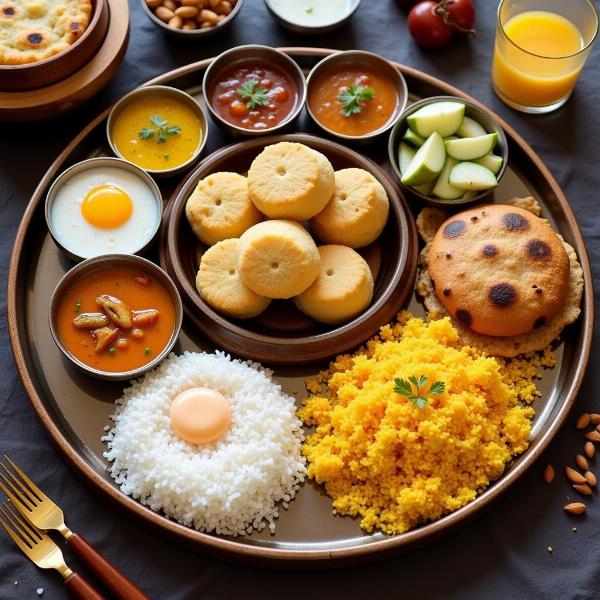Understanding the nuances of “have a breakfast meaning in Hindi” goes beyond simple translation. It delves into the cultural significance of the morning meal in India and the various ways it’s expressed in the Hindi language. This guide explores not only the literal translation but also the related vocabulary, customs, and regional variations associated with breakfast in India.
Breaking Down “Have a Breakfast” in Hindi
The most common way to say “have a breakfast” in Hindi is “नाश्ता करना” (nāśtā karnā). “नाश्ता” (nāśtā) means breakfast, and “करना” (karnā) means to do or to have. So, literally, it translates to “to do breakfast.” While a direct translation might be “breakfast khana” (खाना – khānā means to eat), “nāśtā karnā” is the more idiomatic and widely used phrase. You might also hear phrases like “सुबह का नाश्ता करना” (subah kā nāśtā karnā) which means “to have morning breakfast,” emphasizing the time of the meal.
 Traditional Indian Breakfast Thali
Traditional Indian Breakfast Thali
Regional Variations and Vocabulary
India’s diverse culinary landscape offers a plethora of breakfast options, varying significantly across regions. In South India, you’ll encounter dishes like idli, dosa, vada, and pongal. North India boasts parathas, poori bhaji, and various types of bread like roti and chapati. Understanding these regional differences is crucial for accurately translating “have a breakfast” within a specific context. For example, asking someone in Gujarat if they “had their dhokla” can be a more culturally appropriate way of inquiring about their breakfast.
Common Breakfast Foods in Hindi
Here’s a glimpse into the rich vocabulary of Indian breakfast foods:
- दूध (doodh): Milk
- चाय (chai): Tea
- कॉफ़ी (coffee): Coffee
- रोटी (roti): Flatbread
- पराठा (paratha): Stuffed flatbread
- पूरी (poori): Deep-fried bread
- इडली (idli): Steamed rice cake
- डोसा (dosa): Rice and lentil crepe
- उपमा (upma): Savory porridge
Cultural Context of Breakfast in India
Breakfast in India is not just a meal; it’s a social and cultural experience. In many families, it’s a time for everyone to gather and start the day together. The type of breakfast consumed also reflects religious and cultural beliefs. For example, during festivals, special dishes are prepared, enriching the meaning of “having breakfast.”
Have Your Breakfast Meaning in Hindi: Etiquette and Customs
While “nāśtā karnā” is the standard phrase, using more specific terms based on the food being consumed can enhance communication. For instance, instead of asking, “Did you have breakfast?”, you could ask, “Did you have your paratha?” in a North Indian context.
Have a Breakfast Meaning in Hindi: Beyond Literal Translation
“Have a breakfast meaning in Hindi” encapsulates more than just the act of eating. It embodies the cultural richness, regional diversity, and social significance associated with the morning meal in India. Understanding this broader context is essential for effective communication and translation.
Conclusion
“Have a breakfast meaning in Hindi” is best understood through “नाश्ता करना” (nāśtā karnā) and its various regional and contextual nuances. By exploring the vocabulary, customs, and cultural significance surrounding breakfast in India, we can achieve a more comprehensive and accurate understanding of this seemingly simple phrase.
FAQ
- What is the most common way to say “have a breakfast” in Hindi? The most common way is “नाश्ता करना” (nāśtā karnā).
- Are there regional variations in how “have a breakfast” is expressed in Hindi? Yes, due to the diverse culinary landscape of India, the specific vocabulary for breakfast items varies regionally.
- What are some common breakfast foods in Hindi? Some common ones include दूध (doodh – milk), चाय (chai – tea), रोटी (roti – flatbread), and इडली (idli – steamed rice cake).
- Is there a cultural significance associated with breakfast in India? Yes, breakfast is often a time for families to gather and connect, and the foods consumed can reflect cultural and religious beliefs.
- How can I use more specific terms related to “have a breakfast” in Hindi? Instead of the general phrase, you can use specific food names, like asking, “Did you have your paratha?” in a North Indian context.
Meaning-Hindi.in is your one-stop solution for all your Hindi translation needs. We offer a wide range of services, from business and legal document translation to website localization and technical manual translation. Our expert team understands the nuances of the Hindi language and culture, ensuring accurate and culturally sensitive translations. Need a quick translation or have a complex project? Contact us at [email protected] or call us at +91 11-4502-7584. Meaning-Hindi.in is committed to delivering high-quality translation services tailored to your specific requirements.